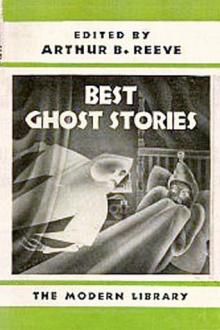In a Steamer Chair and Other Stories - Robert Barr (rm book recommendations .TXT) 📗

- Author: Robert Barr
Book online «In a Steamer Chair and Other Stories - Robert Barr (rm book recommendations .TXT) 📗». Author Robert Barr
"Why, what sage and valuable ideas you have about men, haven't you, my dear?"
"Well, you can't deny but what there is truth in them."
"I not only can, but I do. On behalf of my fellow men, and on behalf of myself, I deny it."
"Then, on the other hand," she continued, "if I confessed to you that I did have half a score or half a dozen of lovers, you would perhaps think I had been jilting somebody or had been jilted. So you see, taking it all in, and thinking the matter over, I shall refuse to answer your question."
"Then you will not confess?"
"Yes, I shall confess. I have been wanting to confess to you for some little time, and have felt guilty because I did not do so."
"I am prepared to receive the confession," replied the young man, lazily, "and to grant absolution."
"Well, you talk a great deal about America and about Americans, and talk as if you were proud of the country, and of its ways, and of its people."
"Why, I am," answered the young man.
"Very well, then; according to your creed one person is just as good as another."
"Oh, I don't say that, I don't hold that for a moment. I don't think I am as good as you, for instance."
"But what I mean is this, that one's occupation does not necessarily give one a lower station than another. If that is not your belief then you are not a true American, that is all."
"Well, yes, that is my belief. I will admit I believe all that. What of it?"
"What of it? There is this of it. You are the junior partner of a large establishment in New York?"
"Nothing criminal in that, is there?"
"Oh, I don't put it as an accusation, I am merely stating the fact. You admit the fact, of course?"
"Yes. The fact is admitted, and marked 'Exhibit A,' and placed in evidence. Now, what next?"
"In the same establishment there was a young woman who sold ribbons to all comers?"
"Yes, I admit that also, and the young lady's name was Miss Katherine Earle."
"Oh, you knew it, then?"
"Why, certainly I did."
"You knew it before you proposed to me."
"Oh, I seem to have known that fact for years and years."
"She told it to you."
"She? What she?"
"You know very well who I mean, George. She told it to you, didn't she?"
"Why, don't you think I remembered you--remembered seeing you there?"
"I know very well you did not. You may have seen me there, but you did not remember me. The moment I spoke to you on the deck that day in the broken chair, I saw at once you did not remember me, and there is very little use of your trying to pretend you thought of it afterwards. She told it to you, didn't she?"
"Now, look here, Katherine, it isn't I who am making a confession, it is you. It is not customary for a penitent to cross-examine the father confessor in that style."
"It does not make any difference whether you confess or not, George; I shall always know she told you that. After all, I wish she had left it for me to tell. I believe I dislike that woman very much."
"Shake hands, Kate, over that. So do I. Now, my dear, tell me what she told _you_."
"Then she _did_ tell you that, did she?"
"Why, if you are so sure of it without my admitting it, why do you ask again?"
"I suppose because I wanted to make doubly sure."
"Well, then, assurance is doubly sure. I admit she did."
"And you listened to her, George?" said Katherine, reproachfully.
"Listened? Why, of course I did. I couldn't help myself. She said it before I knew what she was going to say. She didn't give me the chance that your man had in that story you were speaking of. I said something that irritated her and she out with it at once as if it had been a crime on your part. I did not look on it in that light, and don't now. Anyhow, you are not going back to the ribbon counter."
"No," answered the young lady, with a sigh, looking dreamily out into the hazy distance. "No, I am not."
"At least, not that side of the counter," said George.
She looked at him for a moment, as if she did not understand him; then she laughed lightly.
"Now," said Morris, "I have done most of the confession on this confession of yours. Supposing I make a confession, and ask you to tell me what she told you."
"Well, she told me that you were a very fascinating young man," answered Katherine, with a sigh.
"Really. And did after-acquaintance corroborate that statement?"
"I never had occasion to tell her she was mistaken."
"What else did she say? Didn't mention anything about my prospects or financial standing in any way?"
"No; we did not touch on that subject."
"Come, now, you cannot evade the question. What else did she say to you about me?"
"I don't know that it is quite right to tell you, but I suppose I may. She said that you were engaged to her."
"Had been."
"No, were."
"Oh, that's it. She did not tell you she was on her wedding tour?"
"No, she did not."
"And didn't you speak to her about her father being on board?"
Katherine laughed her low, enjoyable laugh.
"Yes," she said, "I did, and I did not think till this moment of how flustered she looked. But she recovered her lost ground with a great deal of dexterity."
"By George, I should like to have heard that! I am avenged!"
"Well, so is she," was the answer.
"How is that?"
"You are engaged to me, are you not?"
Before George could make any suitable reply to this bit of humbug, one of the officers of the ship stopped before them.
"Well," he said, "I am afraid we shall not see Liverpool to-night."
"Really. Why?" asked George.
"This haze is settling down into a fog. It will be as thick as pea-soup before an hour. I expect there will be a good deal of grumbling among the passengers."
As he walked on, George said to Katherine, "There are two passengers who won't grumble any, will they, my dear?"
"I know one who won't," she answered.
The fog grew thicker and thicker; the vessel slowed down, and finally stopped, sounding every now and then its mournful, timber-shaking whistle.
EIGHTH DAY.
On the afternoon of the eighth day George Morris and Katherine Earle stood together on the deck of the tender, looking back at the huge steamship which they had just left.
"When we return," he said, "I think we shall choose this ship."
"Return?" she answered, looking at him.
"Why, certainly; we are going back, are we not?"
"Dear me," she replied, "I had not thought of that. You see, when I left America I did not intend to go back."
"Did you not? I thought you were only over here for the trip."
"Oh no. I told you I came on business, not on pleasure."
"And did you intend to stay over here?"
"Certainly."
"Why, that's strange; I never thought of that."
"It is strange, too," said Katherine, "that I never thought of going back."
"And--and," said the young man, "won't you go?"
She pressed his arm, and stood motionless.
"'Where thou goest, I will go. Thy people shall be my people.'"
"That's a quotation, I suppose?" said George.
"It is," answered Katherine.
"Well, you see, as I told you, I am not very well read up on the books of the day."
"I don't know whether you would call that one of the books of the day or not," said Katherine; "it is from the Bible."
"Oh," answered the other. "I believe, Kate, you will spend the rest of your life laughing at me."
"Oh no," said the young lady, "I always thought I was fitted for missionary life. Now, look what a chance I have."
"You have taken a big contract, I admit."
They had very little trouble with their luggage. It is true that the English officials looked rather searchingly in Katherine's trunk for dynamite, but, their fears being allayed in that direction, the trunks were soon chalked and on the back of a stout porter, who transferred them to the top of a cab.
"I tell you what it is," said George, "it takes an American Custom-house official to make the average American feel ashamed of his country."
"Why, I did not think there was anything over there that could make you feel ashamed of your country. You are such a thorough-going American."
"Well, the Customs officials in New York have a knack of making a person feel that he belongs to no place on earth."
They drove to the big Liverpool hotel which is usually frequented by Americans who land in that city, and George spent the afternoon in attending to business in Liverpool, which he said he did not expect to have to look after when he left America, but which he desired very much to get some information about.
Katherine innocently asked if she could be of any assistance to him, and he replied that she might later on, but not at the present state of proceedings.
In the evening they went to a theatre together, and took a long route back to the hotel.
"It isn't a very pretty city," said Miss Earle.
"Oh, I think you are mistaken," replied her lover. "To me it is the most beautiful city in the world."
"Do you really mean that?" she said, looking at him with surprise.
"Yes, I do. It is the first city through which I have walked with the lady who is to be my wife."
"Oh, indeed," remarked the lady who was to be his wife, "and have you never walked with----"
"Now, see here," said Morris, "that subject is barred out. We left all those allusions on the steamer. I say I am walking now with the lady who _is_ to be my wife. I think that statement of the case is perfectly correct, is it not?"
"I believe it is rather more accurate than the average statement of the average American."
"Now, Katherine," he said, "do you know what information I have been looking up since I have been in Liverpool?"
"I haven't the slightest idea," she said. "Property?"
"No, not property."
"Looking after your baggage, probably?"
"Well, I think you have got it this time. I _was_ looking after my baggage. I was trying to find out how and when we could get married."
"Oh!"
"Yes, oh! Does that shock you? I find they have some idiotic arrangement by which a person has to live here three months before he can be married, although I was given some hope that, by paying for it, a person could get a special licence. If that is the case, I am going to have a special licence to-morrow."
"Indeed?"
"Yes, indeed. Then we can be married at the hotel."





Comments (0)